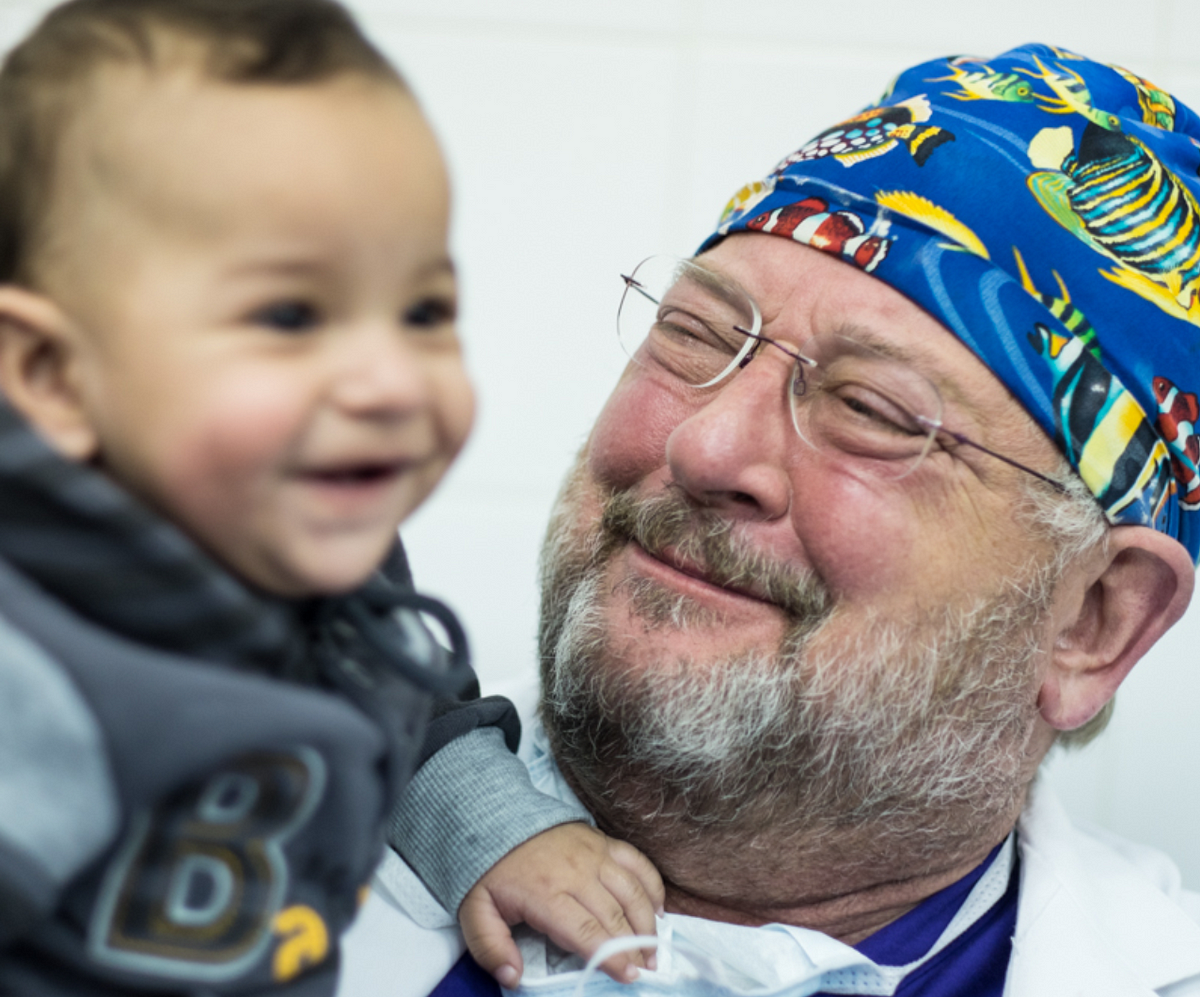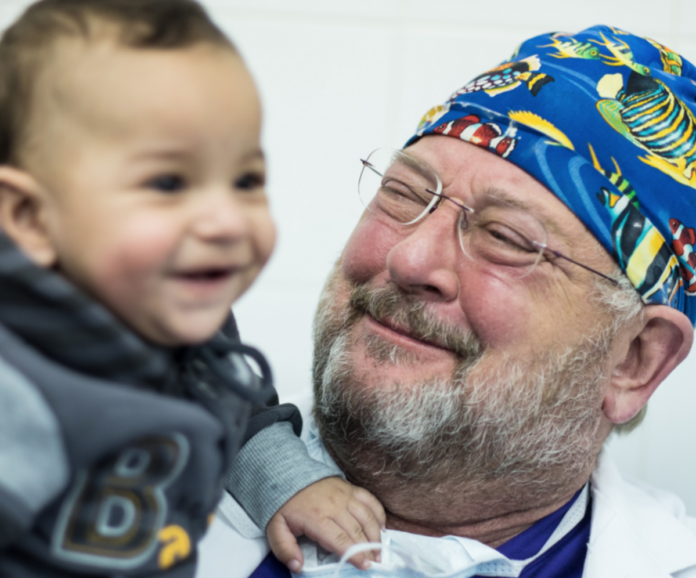Social Impact Heroes: Why Dr. William Novick travels across the world to save children with congenital heart defects

We were in Belgrade in March of 1999 when NATO started bombing the city. We were operating on a ten-day old child with complex heart disease when the bombs began to fall just after sundown. We stayed through the bombing to complete the surgery and get the child to the ICU. Twenty years later on the anniversary of the bombing the child’s mother sent me an email thanking me for not giving up on her child that night as he was now a 20-year-old young man!
As part of my series about “companies and organizations making an important social impact, I had the pleasure of interviewing Dr. William Novick. A world-renowned pediatric cardiothoracic heart surgeon — Dr. Novick has spent his career traveling to some of the world’s most war-torn countries to perform life-saving open heart surgery on children with congenital heart defects. As the founder of Novick Cardiac Alliance (NCA) — a 501(c)3 dedicated to operating on children who otherwise would not have access to medical aid and educating the communities on treating congenital heart defects — Dr. Novick has traveled to more than 34 countries and operated on nearly 10,000 children. His humanitarian efforts have received regional, national, international and governmental accolades including a Congressional Record from the US House of Representatives, the Ukrainian Gold Medal of Peace Award, Kyiv, Ukraine and the Humanitarian of the Year award from the Rotary Gift of Life, Inc. — to name a few. He also is Paul Nermir Junior MD Professor of International Child Health & Surgery at the University of Tennessee Health Science Center (UTHSC) Global Surgery Institute. His humanitarian efforts have been profiled by BBC World Services, National Geographic, FoxNews and Men’s Journal.
Thank you so much for doing this with us! Can you tell us a story about what brought you to this specific career path?
While a resident in cardiac surgery at the University of Alabama I met many families from around the world who brought their children there for surgery. One particular child came from Nigeria, she was 12 and she had complex heart disease that should have been corrected before she was 2. As a result of the damage her heart disease had done we were only able to provide her with an operation which made her feel better, but was not going to prolong her life. At the time of discharge her mother told me how much they appreciated what we had done for her daughter. I was astonished because they came expecting a curative operation and we could not perform it. I left the room very emotional and for the next 6 weeks had nightmares every night about chasing her on an open savannah and when I was just about to catch her she fell of a cliff. Two of my fellow residents were from Colombia and they noticed a gradual change in my behavior…. grumpy, short with everyone, and they ask me to tell them the problem that caused this change. I told them about the Nigerian child nightmares, and they suggested I come down to Bogota to help them start their pediatric cardiac surgery practices. My boss agreed and 6 months later I was in Bogota. I returned to the US and told my boss I wanted to give some of my time away when I went into practice, he told me to be careful as it could consume my life.
Can you share the most interesting story that happened to you since you began leading your organization?
We were in Belgrade in March of 1999 when NATO started bombing the city. We were operating on a ten-day old child with complex heart disease when the bombs began to fall just after sundown. We stayed through the bombing to complete the surgery and get the child to the ICU. Twenty years later on the anniversary of the bombing the child’s mother sent me an email thanking me for not giving up on her child that night as he was now a 20-year-old young man!
Can you describe how you or your organization is making a significant social impact?
Since 1993 we have been assisting in the development of pediatric cardiac services in Low and Middle-Income Countries (LMIC) and have worked in 34 countries, made over 500 trips, operated on nearly 10,000 children and transferred knowledge and experience to hundreds of surgeons, anesthesiologists, cardiologists, intensivists, nurses and technicians during this time. Ninety percent of the programs we have assisted have developed improved pediatric cardiac services as a result of our programs.
Wow! Can you tell me a story about a particular individual who was impacted by this cause?
Medical students frequently travel with us when they are between their first and second year and then again in their last year. We had a female medical student go on a trip between her first and second year who became infected with the humanitarian assistance virus (she loved the whole experience). I interview each student before we accept them, and she told me she thought she wanted to be a pediatrician. Following the trip, she told me she wanted to become a pediatric cardiac surgeon; easy to say, hard to do. Over the next two years (2nd and 3rd of medical school) she performed clinical research using our patient database, presented at regional and national meetings and in her senior year collaborated with me to write a chapter in a pediatric cardiac textbook. She is now in a surgical residency and still planning to become a pediatric surgeon.
Are there three things the community/society/politicians can do help you address the root of the problem you are trying to solve?
Yes. First recognize that pediatric heart disease is a major health problem in Low and Middle-Income countries (LMIC) and there are 80–85% of the children in the world who do not have adequate access to cardiac care (waiting list for surgery is estimated to be 7 MILLION children and another MILLION are born annually in these countries); Second, individuals, civic groups, foundations and corporations contribute funds, medical supplies and transportation services to help NGO’s provide these services around the world; and third the US government should recognize the significance of the positive impact that these services provide regarding the perception the people and governments have of the USA, and provide NGO’s with financial and support assistance. Medical Diplomacy is a real phenomenon!

What are your “5 things I wish someone told me when I first started” and why. Please share a story or example for each.
- That politics would be such a large part of medicine. A friend of mine, also a pediatric cardiac surgeon, took a family vacation, during that time the Medical Director of his hospital changed and the surgeon’s junior partner mis- represented the result data to the new Medical Director and got my friend suspended.
- That one should always have a Lawyer review contracts. My first job was to be the pediatric heart surgeon for a group of 7 adult cardiac surgeons. I was told that until I built the peds practice to 200 cases annually I would have to operate on adults as well. When I hit 250 cases annually, I requested to be taken off the adult service, they refused saying that was not in my contract.
- That I would write a book about humanitarian pediatric cardiac surgery. “Healing the Heart of Croatia” was my first published book in 1998 and I am currently working on number two, “Blue Babies, Bombs and Bad Places.”
- That it would take me multiple tries with wives before I found my soul mate. I finally married the person who made my life complete when I married my wife, Elizabeth in 1999.
- That none of my 5 children would be interested in Medicine. Why? They all say the same thing “Dad you work too hard.”
How do you define “Leadership”? Can you explain what you mean or give an example?
Last year I co-authored a chapter with Dr. Kathleen Fenton (works at National Institutes of Health) on the Ethics, Influence and Power of Leadership for a textbook on Medical Leadership. There are many attributes credited to leaders and they all have both positive and negative impacts on leadership depending on how the individual uses these characteristics. One of my favorite examples is the use of power; a leader can use her/his power to advance the career of one or more of her/his subordinates, alternatively this power can be used negatively by either gender to intimidate subordinates into accepting sexual harassment or unwanted relationships fearing dismissal or demotion. A leader should motivate her/his team, provide them with advice on advancement, be ethical, transparent, honest, charismatic, fearless in the face of adversity and a dynamic worker. Integrity is the cornerstone of a good leader.
Can you please give us your favorite ”Life Lesson Quote”? Can you share how that was relevant to you in your life?
“Luck favors those who are prepared to take advantage of the opportunity presented.” We are often requested to add another program with little or no warning, we are prepared in most cases to turn that request into a life-saving program within weeks of the request, if funding is not an issue.
You are a person of enormous influence. If you could inspire a movement that would bring the most amount of good to the most amount of people, what would that be? You never know what your idea can trigger. 🙂
A global awakening of the issues of life and death for the millions of children born yearly with heart disease who an operation would cure, but they have no access. We need to commit funds to provide services, education, infrastructure and supplies to those working on solutions in these poor countries around the world.
Is there a person in the world, or in the US whom you would love to have a private breakfast or lunch with, and why? He or she might just see this, especially if we tag them. 🙂
President Trump, I would like to explain to him how Medical Diplomacy can be used as Soft Power to change the perception of the USA around the world without bombs or bullets.
How can our readers follow you on social media?
Facebook: @CardiacAlliance
Twitter: @CardiacAlliance
Instagram: @Cardiac_Alliance
LinkedIn: @WilliamNovickGlobalCardiacAlliance


